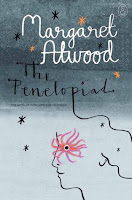Book Review: The Penelopiad by Margaret Atwood
 |
⭐⭐⭐⭐
“I knew he was tricky and a liar, I just didn’t think he would play his tricks and try out his lies on me. Hadn’t I been faithful? Hadn’t I waited, and waited, and waited, despite the temptation–almost the compulsion–to do otherwise? And what did I amount to, once the official version gained ground? An edifying legend. A stick used to beat other women with. Why couldn’t they be as considerate, as trustworthy, as all-suffering as I had been?”
In the 21st century, Penelope now in Hades, narrates the story of her life from her birth and early years in Sparta to her marriage to Odysseus at the age of fifteen and the years she spent waiting for her husband to return to Ithaca after the fall of Troy. She talks about the events revolving around the fall of Troy and Odysseus’s journey back to Ithaca, while also drawing comparisons to some aspects of life in modern times. She is visited by both Odysseus and Helen in the afterlife, both of whom go back to the living world time and time again but Penelope is quite content to not venture back into the living world again.
“My past life was fraught with many difficulties, but who’s to say the next one wouldn’t be worse?"
In Margaret Atwood’s The Penelopiad, Penelope is portrayed as smart and sarcastic and does not mince her words. She has no illusions about herself and sees her husband exactly for who he is (“ “What a fool he made of me, some say. It was a specialty of his: making fools. He got away with everything, which was another of his specialties: getting away.” ), understands her marriage for exactly how and what it is (“The two of us were–by our own admission–proficient and shameless liars of long standing. It’s a wonder either one of us believed a word the other said. ), and doesn’t have much good to say about her cousin Helen ( jealousy, resentment and anger - all the emotions are expressed!).
"I've often wondered whether, if Helen hadn't been so puffed up with vanity, we might all have been spared the sufferings and sorrows she brought down on our heads by her selfishness and her deranged lust. Why couldn't she have led a normal life? But no - normal lives were boring, and Helen was ambitious. She wanted to make a name for herself. She longed to stand out from the herd."
While her husband is away (10 years fighting in Troy and 10 years of (mis)adventures that followed that she is aware of through minstrels who regale all and sundry with tales of her husband’s heroic exploits.) Penelope was busy managing stately affairs, raising their son, Telemachus and keeping the hordes of obnoxious suitors at bay. Aided by her maids who mingle with the suitors, often on her instruction and are subject to mistreatment by them, she manages to hold them off till her husband returns buying time by weaving and unweaving a shroud for her father-in-law, promising to choose amongst them once her work is done while they eat, drink and revel their way through her fortunes. Upon return, Odysseus and his son, Telemachus not only kill all the suitors and the the traitorous shepherd who was aiding them but also hang the twelve maids for their “improper” relations with the suitors. This story gives a voice to Penelope and her twelve maids and does attempt to shed a light on women in the classics whose voices were unheard. The fate of the twelve maids and the injustice of how they were treated will make you question not only Odysseus and Telemachus’s attitude towards women but also Penelope’s role and reaction to the whole episode- a fact that Penelope reflects upon even from the Underworld. Each chapter is interspersed with the Greek chorus of the twelve maids who were hanged and who have taken it upon themselves to follow Odysseus through the ages.
“We can see through all your disguises: the paths of day, the paths of darkness, whichever paths you take–we’re right behind you, following you like a trail of smoke, like a long tail, a tail made of girls, heavy as memory, light as air: twelve accusations, toes skimming the ground, hands tied behind our backs, tongues sticking out, eyes bulging, songs choked in our throats.”
Margaret Atwood’s The Penelopiad is entertaining, witty and cleverly written. I particularly enjoyed the 21st-century courtroom scene, in one of the chapters where Odysseus is being tried for the murder of the twelve maids, with the judge referencing the book that is the main authority on the subject( The Odyssey). At less than 200 pages this is a short, light yet thought-provoking read that has moments that will inspire serious thought as well as moments that will have you laughing out loud and tipping your hat to Ms.Atwood for the imaginative, darkly humorous characterizations of these flawed characters. I paired the read with the wonderful audio narration (3 hours 19 minutes) by Laural Merlington which made for an exceptional immersion reading experience.
Comments
Post a Comment